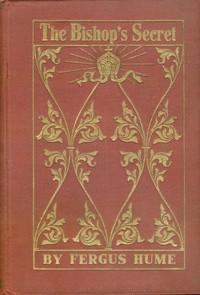Read this ebook for free! No credit card needed, absolutely nothing to pay.
Words: 111558 in 58 pages
This is an ebook sharing website. You can read the uploaded ebooks for free here. No credit cards needed, nothing to pay. If you want to own a digital copy of the ebook, or want to read offline with your favorite ebook-reader, then you can choose to buy and download the ebook.
THE BISHOP'S SECRET
FERGUS HUME,
PREFACE
In his earlier works, notably in "The Mystery of a Hansom Cab" and "The Silent House in Pimlico," Mr. Hume won a reputation second to none for plot of the stirring, ingenious, misleading, and finally surprising kind, and for working out his plot in vigorous and picturesque English.
In "The Bishop's Secret," while there is no falling off in plot and style, there is a welcome and marvelous broadening out as to the cast of characters, representing an unusually wide range of typical men and women. These are not laboriously described by the author, but are made to reveal themselves in action and speech in a way that has, for the reader, all the charm of personal intercourse with living people.
Mr. Hume's treatment of the peculiar and exclusive ecclesiastical society of a small English cathedral city is quite worthy of Anthony Trollope, and his leading character, Bishop Pendle, is equal to Trollope's best bishop. The Reverend Mr. Cargrim, the Bishop's poor and most unworthy proteg?, is a meaner Uriah Heep. Mrs. Pansey is the embodiment of all shrewishness, and yields unlimited amusement. The Gypsies are genuine--such as George Borrow, himself, would have pictured them--not the ignorant caricatures so frequently drawn by writers too lazy to study their subject.
Besides these types, there are several which seem to have had no exact prototypes in preceding fiction. Such are Doctor Graham, "The Man with a Scar," the Mosk family--father, mother, and daughter--Gabriel Pendle, Miss Winchello, and, last but not least, Mr. Baltic--a detective so unique in character and methods as to make Conan Doyle turn green with envy.
All in all, this story is so rich in the essential elements of worthy fiction--in characterization, exciting adventure, suggestions of the marvelous, wit, humor, pathos, and just enough of tragedy--that it is offered to the American public in all confidence that it will be generally and heartily welcomed.
THE PUBLISHERS.
'ENTER MRS PANSEY AS CHORUS'
Her first step was to wheedle an invitation out of Mrs Pansey, an archdeacon's widow--then on a philanthropic visit to town--and she arrived, towards the end of July, in the pleasant cathedral city of Beorminster, in time to attend a reception at the bishop's palace. Thus the autumn manoeuvres of Miss Norsham opened most auspiciously.
Mrs Pansey, with whom this elderly worshipper of Hymen had elected to stay during her visit, was a gruff woman, with a scowl, who 'looked all nose and eyebrows.' Few ecclesiastical matrons were so well known in the diocese of Beorminster as was Mrs Pansey; not many, it must be confessed, were so ardently hated, for there were few pies indeed in which this dear lady had not a finger; few keyholes through which her eye did not peer. Her memory and her tongue, severally and combined, had ruined half the reputations in the county. In short, she was a renowned social bully, and like most bullies she gained her ends by scaring the lives out of meeker and better-bred people than herself. These latter feared her 'scenes' as she rejoiced in them, and as she knew the pasts of her friends from their cradle upwards, she usually contrived, by a pitiless use of her famous memory, to put to rout anyone so ill-advised as to attempt a stand against her domineering authority. When her tall, gaunt figure--invariably arrayed in the blackest of black silks--was sighted in a room, those present either scuttled out of the way or judiciously held their peace, for everyone knew Mrs Pansey's talent for twisting the simplest observation into some evil shape calculated to get its author into trouble. She excelled in this particular method of making mischief. Possessed of ample means and ample leisure, both of these helped her materially to build up her reputation of a philanthropic bully. She literally swooped down upon the poor, taking one and all in charge to be fed, physicked, worked and guided according to her own ideas. In return for benefits conferred, she demanded an unconditional surrender of free will. Nobody was to have an opinion but Mrs Pansey; nobody knew what was good for them unless their ideas coincided with those of their patroness--which they never did. Mrs Pansey had never been a mother, yet, in her own opinion, there was nothing about children she did not know. She had not studied medicine, therefore she dubbed the doctors a pack of fools, saying she could cure where they failed. Be they tinkers, tailors, soldiers, sailors, Mrs Pansey invariably knew more about their vocations than they themselves did or were ever likely to do. In short, this celebrated lady--for her reputation was more than local--was what the American so succinctly terms a 'she-boss'; and in a less enlightened age she would indubitably have been ducked in the Beorflete river as a meddlesome, scolding, clattering jade. Indeed, had anyone been so brave as to ignore the flight of time and thus suppress her, the righteousness of the act would most assuredly have remained unquestioned.
Free books android app tbrJar TBR JAR Read Free books online gutenberg
More posts by @FreeBooks


: More Russian Picture Tales by Karrik Valerian Viliamovich Forbes Nevill Translator - Folklore Russia Children's Picture Books; Folklore; Children's Myths Fairy Tales etc.









